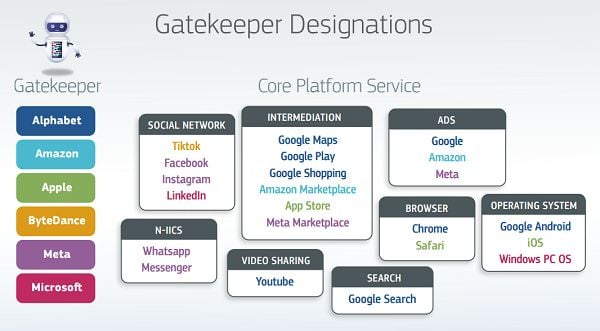This will be an interesting test of Meta’s unification strategy, which it seemingly implemented to fend off calls for a break-up of the company, amid questions over its acquisitions of Instagram and WhatsApp.
This week, Meta has launched an appeal against E.U. “gatekeeper” designations for Messenger and Marketplace as separate entities, arguing instead that both are in fact elements of Facebook, and should be assessed as such.
Under the new E.U. Digital Markets Act (D.M.A.), platforms which E.U. officials consider to be providing “an important gateway between businesses and consumers” are now labeled as “gatekeeper” apps, which then subjects each to new rules around neutrality, openness, and other regulatory measures.

As you can see in this overview, Messenger and Marketplace are currently considered to be gatekeeper services, which, for Messenger, will see it held to new rules relating to interoperability standards, while Marketplace would need to adhere to additional consumer protection laws in the region.
But Meta is arguing that they’re not actually separate, and that neither should be governed in isolation from Facebook itself. Though interestingly, Meta’s not arguing that WhatsApp and Instagram should be viewed separately in the same vein.
A key consideration here is that Meta has been working for years to integrate its messaging platform, which will eventually enable users to access a single, universal inbox for their Messenger, WhatsApp and IG Direct chats, which would be available across all three apps. That, theoretically, could then enable Meta to argue that all of its various apps are actually part of a single system, which would then make it impossible to separate them in terms of governance measures, like this, or with respect to a potential company break-up.
Several anti-trust and anti-competition cases have proposed that Meta should be broken up, as its acquisitions have enabled it to establish a monopolistic hold over the digital ads market. That view was enough to halt Meta’s acquisition of GIF platform GIPHY, and has seemingly stopped Meta from any further takeover activity as a result.
But by merging its tools into one, essentially welding them together under a single “Meta” banner, it seemed that the company was solidifying itself against further similar challenges, which could now come into play in this instance.
What if, for example, Meta is able to get E.U. officials to agree that Messenger is not a separate entity, and therefore shouldn’t be subject to the new gatekeeper provisions? Does that then mean that, by extension, WhatsApp and IG Direct would also be considered a part of its core platform, and should also not be viewed as gatekeepers in themselves?
Meta hasn’t enacted its full messaging integration plan as yet, but it is coming, and if it can win this ruling, that could pave the way for a bigger push from Meta to limit the impacts of some of these new provisions.
Meta isn’t at that stage yet, but that seems to be the end goal here, in re-categorizing the new E.U. designations to better benefit its business interests.
It’s an interesting pushback either way, with the determination from the E.U. potentially set to have a big impact on Meta-related policy moving forward.



